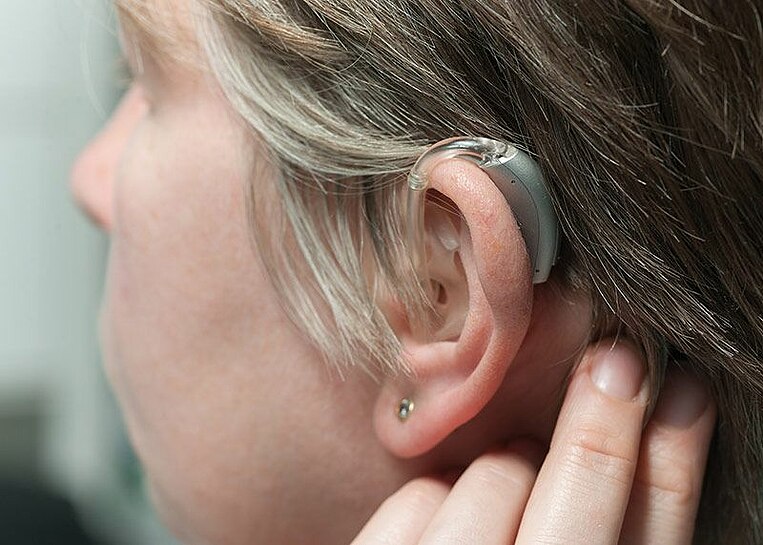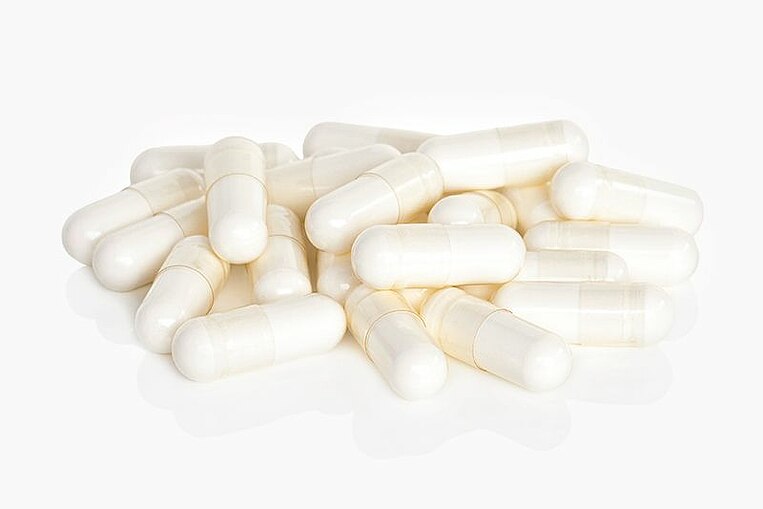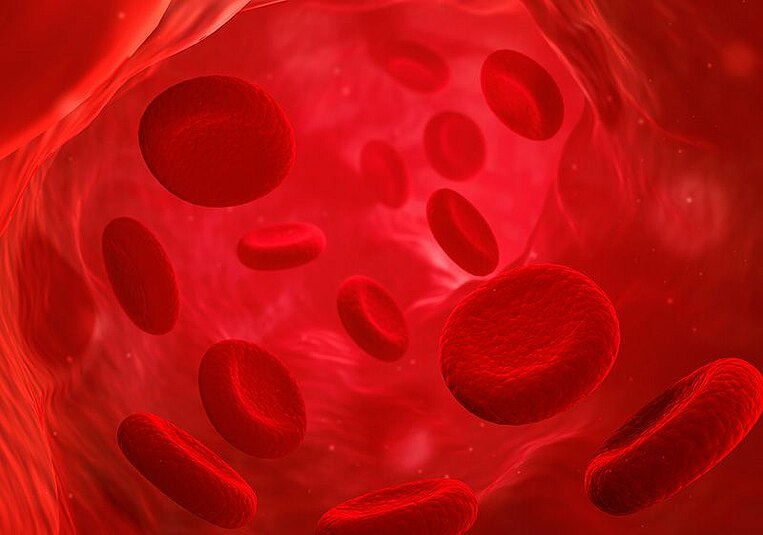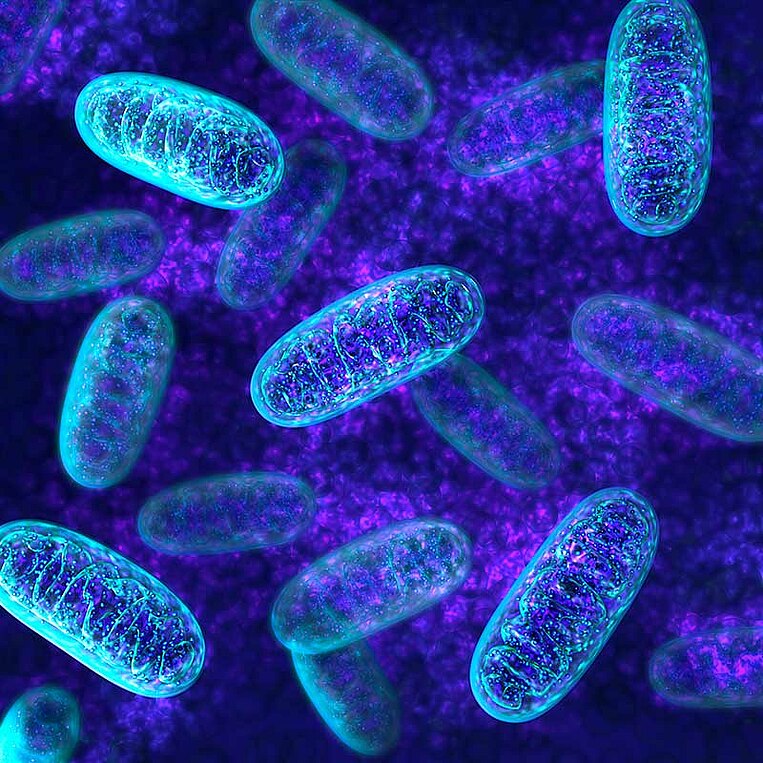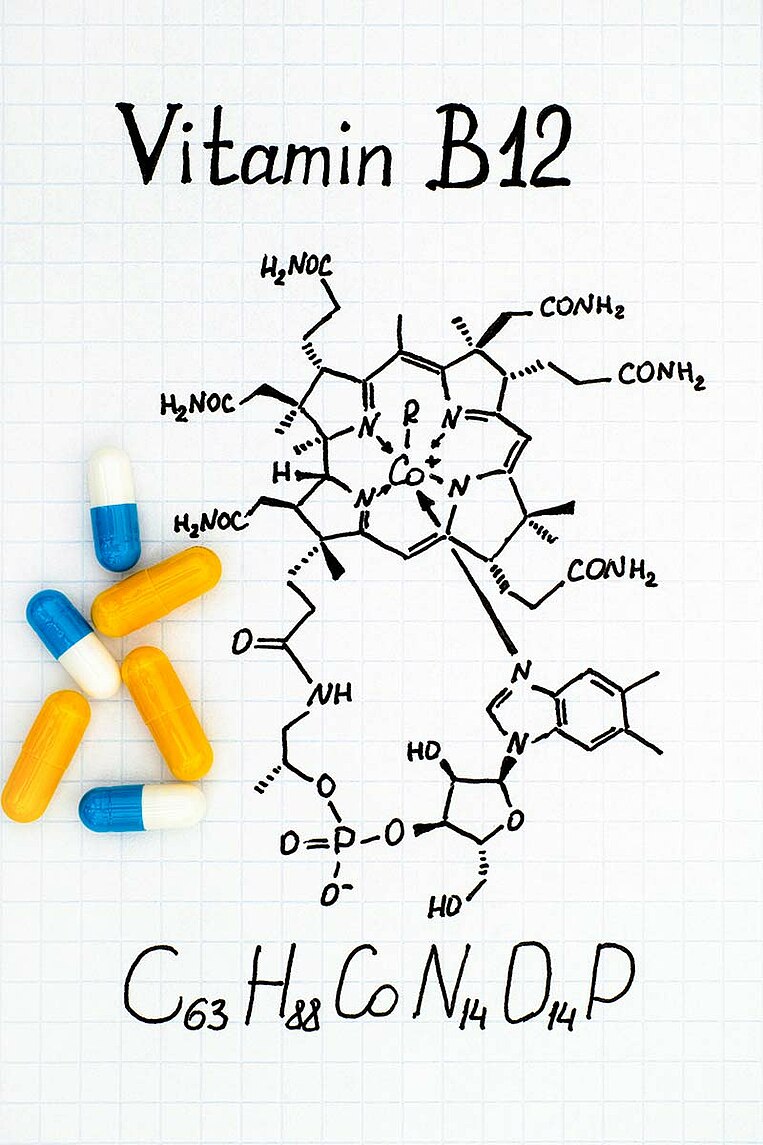Tinnitus is defined as having continuous or intermittent sounds in the ear without external auditory stimuli. In many cases, tinnitus stems from an episode of acute hearing loss. This is usually a sudden loss of hearing generally affecting only one ear. Certain types of micronutrients can help reduce the symptoms of tinnitus and improve hearing. They promote blood circulation in the ear while protecting cells dealing with sensitive hearing. Find out here which micronutrients can help.
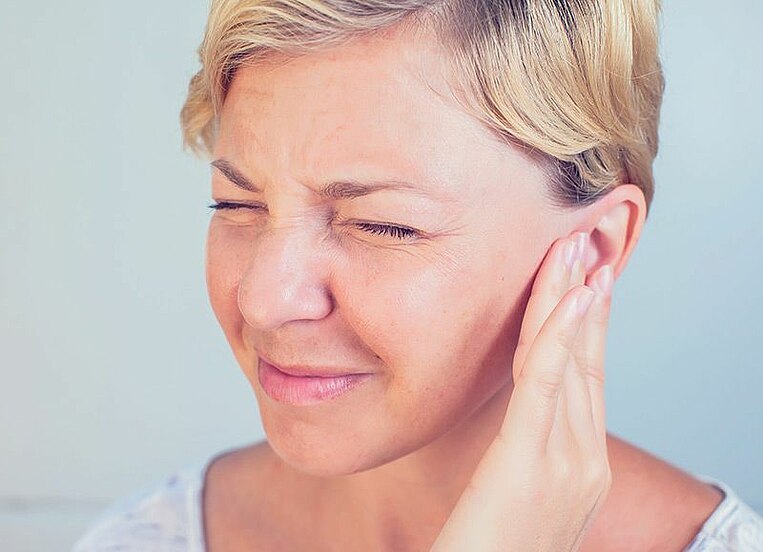
Causes and Symptoms
The symptoms of tinnitus and acute hearing loss
Tinnitus: Tinnitus, also known as tinnitus aurium or tinnitus auris, causes those affected to hear continuous or intermittent noises without the presence of external auditory stimuli. The type of noise can vary greatly: It can be perceived as whistling, ringing, pulsing, humming, or sawing noises.
The most common form is known as subjective tinnitus. Only those effected can hear the sounds. In contrast, objective tinnitus is when there is a sound source in body located close to the ear like the flowing of blood through an adjacent artery for example.
Tinnitus can be acute or chronic. The acute form of tinnitus can last for up to three months. It is defined as chronic if the symptoms last more than three months.
Tinnitus can have a severely negative effect on the quality of life of those affected and trigger many problems such as anxiety, depression, or sleeping problems.
Info
The term tinnitus aurium is made up of two words: Tinnitus comes from the word for ringing and auris means ear.
Acute hearing loss: Acute hearing loss is defined as sudden inner ear deafness. This means the first stage of the hearing process still functions normally: The sounds waves are able to reach the inner ear as usual. However, these sensory stimuli are then not processed correctly by the inner ear.
Acute hearing loss tends to affect only one side. It can affect all hearing frequencies or be limited to certain ones. In 80 to 90% of cases, those affected will also suffer from tinnitus, which is usually high frequency. There are also various grades of severity: While low-grade acute hearing loss only leads to slight hearing loss, more severe cases can lead to a total loss of hearing.
Common accompanying symptoms are the sensation of pressure in the ear and vertigo (dizziness). In many cases symptoms will go away without the need for treatment. However, tinnitus or reduced hearing capacity can remain.
The causes of tinnitus and acute hearing loss
The exact mechanisms which lead to tinnitus and acute hearing loss are still not fully understood. There are various possible causes:
- Noise, acoustic trauma
- emotional strain (stress, burnout, overwork, anxiety)
- blockage of the auditory canal with ear wax or a foreign object such as a cotton bud
- chronic middle ear infection
- burst ear drum
- Otosclerosis: A bone disease located in the middle ear
- Menière's disease: Sudden attacks of vertigo (dizziness)
- Age-related hardness of hearing
- Circulation problems
- Jaw muscle or jaw joint complaints
- Changes or blockages in the cervical spine
- non-malignant tumors affecting the auditory nerve (vestibular schwannoma)
Additionally, tinnitus can stem from: High blood pressure (hypertension), low blood pressure (hypotension), cardiovascular disease (arrhythmia, arteriosclerosis), and metabolic diseases (diabetes mellitus), and hypo- or hyperthyroidism, elevated blood fat levels, anemia, a traumatic brain injury or anesthetics.
Goal of the treatment
What is the standard treatment for tinnitus and acute hearing loss?
The cause is often unclear, and the high rate of spontaneous recovery make the treatment of tinnitus and acute hearing loss difficult. A variety of therapeutic approaches are applied:
During the acute phase, doctors tend to administer high doses of cortisone. This is administered either as an infusion or tablets. The goal of medication-based treatment is to reduce the signs of inflammation while simultaneously preventing damage to the hair and nerve cells in the inner ear.
Oxygen therapy is an option for the treatment of acoustic trauma and inner ear damage. Based on the assumption that this is caused by a lack of oxygen in the inner ear, those affected are administered pure oxygen in a hyperbaric chamber. However, the effectiveness of this treatment is still controversial.
If the cause of the tinnitus stems from the cervical spine, then psychotherapeutic applications such as physiotherapy and chirotherapy are advisable.
To counteract permanent tinnitus, small devices known as maskers or noisers are used. This can help distract those affected from their tinnitus.
If the hearing problems stemming from acute hearing loss become permanent, then a hearing aid will be necessary. In the rare cases of total deafness, an artificial inner ear, known as a cochlear implant, will be fitted.
The aims of micronutrient medicine
Micronutrient therapy can be used as a supportive therapy during the treatment of tinnitus or acute hearing loss. Thanks to their nerve-protecting, antioxidative, blood vessel-dilating, and blood circulation-promoting properties, certain types of mineral and plant substances can help prevent further damage to the inner ear, reduce the effects of tinnitus and acute hearing loss, and have a positive effect on the progress of the disease:
- Magnesium dilates the blood vessels, protects the nerve cells as well as counteracting stress-related magnesium deficiency.
- Ginkgo biloba and pine bark extract promote vascular dilation and blood circulation.
- The vitamins A, C, E, zinc or N-acetyl cysteine have antioxidant effects which help protect the nerve cells from damage.
- Coenzyme Q10 promotes the energy supply to the cells.
- Vitamins B6, B12 and folic acid protect against the cell-damaging substance homocysteine which can also damage the auditory (hearing) nerves.
Treatment using micronutrients
Magnesium dilates the blood vessels and protects the nerve cells.
How magnesium works
Magnesium regulates the tension in the blood vessels and ensures that the signal transmission functions correctly during the hearing process.
Magnesium deficiency can cause damage to the ears and can contribute to acoustic damage stemming from over-stimulation of the nerves. It can also cause toxic substances or medication (aminoglycoside antibiotics like gentamicin and the cancer drug Cisplain) to cause more damage to the auditory (hearing) nerves. Permanent and temporary hearing loss and reduced circulation have also been linked to magnesium deficiency.
Magnesium deficiency has been linked to tinnitus. A study with 76 patients with severe bilateral subjective tinnitus were found to be much more likely to be suffering from magnesium deficiency that the healthy control subjects.
This mineral has the ability to cross the barrier between the bloodstream and the cochlear fluid in the ear. Thus magnesium can be administered in the treatment of tinnitus or to protect from acute hearing loss.
Several studies point to the fact that supplementation with magnesium can have positive effects on the severity of the tinnitus: A study separated patients with sudden acute hearing loss, with no discernible cause, into two groups. They were given either cortisone and magnesium or cortisone and a placebo. Compared to the control group, the group who had been given a magnesium supplement showed a notable improvement of the hearing capacity.
Additionally, magnesium has a positive influence on stress-related tinnitus. It counteracts the stress hormone cortisole and has a relaxing effect on the muscles and blood vessels. This prevents hearing loss relating to nerve damage caused by poor blood circulation.
Dosage and Recommended Use
For the treatment of tinnitus and acute hearing loss, micronutritionists recommend a dosage of between 300 and 600 milligrams of magnesium per day - ideally taken in several portions throughout the day, for example 150 to 300 milligrams twice daily.
Depending on the sensitivity of each individual, even small amounts of magnesium (250 milligrams) can cause diarrhea. Then it is recommended to take the magnesium in several small doses over the course of the day.
Magnesium supplements should be taken over a longer period of time to ensure that the deficiency is counterbalanced. Regular magnesium level monitoring is necessary if taking more than 250 milligrams of magnesium per day in the long-term.
Laboratory: Determining magnesium levels
Magnesium is most prominently found in the red blood cells. Therefore, testing to determine a possible magnesium deficiency should be done using whole blood. Whole blood contains all the red blood cells. The normal magnesium levels in whole blood are between 1.38 and 1.50 millimoles per liter.
The magnesium levels in the blood serum can also be significant if suffering from ear problems. Blood serum has contact with lymph fluid which in turn has contact with the ear. Studied have shown a correlation between magnesium levels in the blood serum and both tinnitus and acute hearing loss. The normal range in the serum is between 0.8 and 1.1 millimoles per liter.
It is advisable to undergo magnesium level blood testing at your doctor's practice after three to four weeks.
Magnesium: Instructions if taking other medication or if suffering from disease
Magnesium is generally well-tolerated by most people. However, in combination with certain types of medications, it can produce insoluble complexes and therefore reduce the effects of the medication. These include antibiotics, especially gyrase inhibitors and tetracycline, as well as osteoporosis medications (Bisphosphates like Alendronate, Clodronate and Etidronate).
When using any of these medication simultaneously with magnesium, a break of at least two hours should be observed between taking the medication and using a magnesium supplement.
Those with chronic kidney disease should use supplements to increase their magnesium intake. Weakened kidneys are not able to effectively excrete excess magnesium. The supplemented magnesium would begin to collect and build up in the blood.
In the treatment of tinnitus, ginkgo has blood vessel-dilating and circulation promoting effects.
How ginkgo biloba works
An extract from the leaves of the ginkgo tree is used to treat circulation disorder and vertigo (dizziness). Its active pharmaceutical ingredients - especially flavonoids and terpenes (ginkgolides and bilobalide) – promote the circulation of blood into the smallest blood vessels in the inner ear. This better provides the cells and nerves with nutrients and oxygen and allows them to better recover from any damage.
Ginkgo also prevents the adhesion of the blood platelets and so helps prevent the blockage of the small blood vessels and a possible new episode of hearing loss.
A review of eight extensive studies showed that the use of ginkgo biloba extract can clearly reduce the symptoms of tinnitus and notably improve the patient's quality of life. However, the evidence to support the use of ginkgo in the treatment of tinnitus is not undisputed: Some patients were not helped by ginkgo extract. This may be related to the different types of tinnitus.
Dosage and Recommended Use
A daily dose of 120 to 240 milligrams of ginkgo extract containing at least 3.3 milligrams is recommended. Studies confirmed the effectiveness and safety of these dosages. Ginkgo should be taken during mealtimes.
Tips
Be sure to purchase a product which contains low-levels of ginkgoic acid. Ginkgoic acid in large amounts can be damaging to the cells. Ginkgo teas are less suitable: They can contain higher levels of ginkgoic acid than other products and the amount of active ingredient can also vary greatly. Therefore it is not easy to correctly dose the tea.
Ginkgo: Instructions if using cough medicine and when pregnant
Ginkgo can amplify the effects of anticoagulation medications and increase the tendency to bleed. Therefore, ginkgo should not be used with the following types of active substances without consulting a doctor beforehand: Phenprocoumon, Warfarin, Clopidogrel and acetylsalicylic acid. The doctor can regularly test coagulation status (INR).
The doctor should also ensure that there are no coagulation disorders.
There is currently not enough suitable study literature dealing with the use of pine bark extract during pregnancy or when breast feeding. Therefore, the possible risks and benefits of the treatment should be scrutinized by a doctor beforehand.

Pine bark improves blood flow and vascular function.
How pine bark extract works
Pine bark extract contains high levels of obligomeric procyanidin (OPCs). This highly-effective plant substances have both strong antioxidant and anti-inflammatory effects. This means that they are capable of preventing cell damage caused by free radicals. Oxidative stress is linked to tinnitus-related hearing loss. Oxidative stress can damage and kill the nerve cells.
Pine bark extract also counteracts the narrowing of the blood vessel and is involved in the regeneration and protection provided by vitamin C and E. Initial tinnitus and acute hearing loss study results have already been published:
One study showed the use of pine bark extract for an average of five weeks can reduce the symptoms of tinnitus by improving blood circulation in the inner ear.
A further study focused on approx. 120 patients suffering from vertigo, hearing loss, tinnitus, pressure in the ear and therefore also an unsteady gait. One group was given a standard course of treatment, the other pine bark extract. After six months blood circulation in the inner ear in the group which had been given the pine bark extract had improved notably in comparison to the standard treatment group. During pine bark extract treatment, approx. 88 percent of the those affected were without symptoms, in comparison to only approx. 35 percent in the control group.
Dosage and Recommended Use
Dosages of between 100 and 150 milligrams of pine bark extract (containing at least 70 milligrams of procyanidin) per day were successfully tested, with a higher dose having a greater effect. Micronutritionists recommend beginning with 100 milligrams per day.
Pine bark extract should ideally be taken before meals.
Pine bark extract: Instructions when using blood-thinning medication, when pregnant, and when breastfeeding
Studies have shown that pine bark extract can slightly reduce the effects of blood-thinning medications. Although, it does not appear to reduce the effects of the active pharmaceutical ingredient acetylsalicylic acid (ASA), patients who plan to take pine bark extract and ASA simultaneously should talk to their doctor beforehand.
There is currently no adequate research on the use of pine bark extract during pregnancy or when breastfeeding. The benefits of use should be critically assessed by a doctor.
Antioxidative protection of the auditory (hearing) cells using vitamins A, C, E, and zinc.
How antioxidants work
The production of cell-damaging free radicals plays an important role in the development of acoustic-related hearing loss. One consequence is reduced blood circulation in the inner ear. Antioxidative micronutrients such as vitamin A, C, and E in combination with zinc can help counteract this process.
A nutritional study in the USA with more than 2,500 participants showed: Those who consumed large amounts of antioxidant vitamins such as beta-carotene (vitamin A precursor) and vitamin C along with magnesium had a reduced risk of hearing loss compared to those with a lower intake of these nutrients.
Supplementation with antioxidants also has a positive effect: Vitamins E and C were able to improve the hearing capacity following sudden hearing loss with an unknown cause, by approx. 63 percent (29 decibels). In the control group the improvement was only approx. 44 percent (19 decibels).
Tips
Magnesium complements the effects: When administered on their own, neither the antioxidants or the magnesium produced a reliable reduction of the acoustic-stress related hearing loss of cell damage. However, as a combination supplement there were very effective, even when the treatment was only begun one hour before the exposure to acoustic stress.
To combat stress, which is a possible cause of tinnitus and acute hearing loss, a higher dosage is required. A study with 100 tinnitus patients showed a close correlation between the zinc levels and the severity and volume of the tinnitus. Zinc was also linked to hearing threshold impairment.
Dosage and Recommended Use
A combination of antioxidants should be supplemented if suffering from tinnitus or acute hearing loss. They promote the effects and support the regenerative processes of one another after neutralizing free radicals.
The following dosages are recommended:
- Up to 800 micrograms of Vitamin A
- at least 200 milligrams of Vitamin C
- 60 milligrams of vitamin-E complex (from tocopherols and tocotrienols)
- up to 25 milligrams of zinc (more to treat zinc deficiency)
Fat-soluble antioxidants like vitamin A and E must be taken at mealtimes: Only when consumed with the fat contained in the meal can these vitamin reach the bloodstream via the intestines. Overall, the intake of these supplements at mealtimes makes them easier to digest; zinc is a good example.
Antioxidants: Instructions during pregnancy, if taking medication or during illness
Kidneys problems can disrupt the processes which breakdown vitamin A and remove zinc from the body. This increases the risk of suffering an overdose of vitamin A or zinc. Therefore, those with kidney disease should avoid the use of vitamin A or additional supplements.
An overdose of vitamin A during pregnancy can cause growth problems and deformities to the unborn child. Therefore, pregnant women should not take vitamin A supplements.
Zinc and certain types of medications can produce insoluble compounds, which means they both lose their effectiveness. These include certain types of antibiotics (Tetracyclines, gyrase inhibitors, osteoporosis medications (bisphosphonates) and antirheumatic medications (d-Penicillamine). When taking zinc with any of the listed medications, an interval of at least 3 hours must be observed between taking one or the other.
Coenzyme Q10 promotes the energy supply to the cells.
How coenzyme Q10 works
Coenzyme Q10 is involved in the energy production in the mitochondria, which are the power plants in our cells. It also ensures that our hearing cells have enough energy to function correctly. As an antioxidant, coenzyme Q10 protects our cells from harmful free radicals.
In a small study with 20 chronic tinnitus patients with low Q10 coenzyme Q10 levels in their blood, the supplementation with Q10 led to a notable improvement of the symptoms recorded by the participants in the study questionnaire.
Another study confirmed the effectiveness following sudden acute hearing loss: In this study, supplementation with coenzyme Q10 in combination with steroid-based (cortisone) treatment led to a clear improvement in the ability to understand speech compared to the results of a standard course of therapy.
A further study found that a 30-day course of treatment with coenzyme Q10 sped up the recovery process following exposure to acoustic stress.
Dosage and Recommended Use
For tinnitus, micronutritionists recommend the intake of 100 to 300 milligrams of coenzyme Q10 per day.
Fat contained in food improves the absorption of coenzyme Q10 in the body. This is why it should be taken during mealtimes.
Coenzyme Q10: Instructions if using blood-thinning medication
Coenzyme Q10 can reduce the effects of certain types of blood-thinning medication. These include medications containing the active pharmaceutical ingredient phenprocoumon and Warfarin. These effects have been reported when using coenzyme Q10 at dosages as low as between 30 and 100 milligrams. The simultaneous intake should be discussed with your doctor beforehand. In this case it is important to test the Quick value (prothrombin time) in the blood.
N-acetyl cysteine counteracts metabolic damage
How N-acetyl cysteine works
N-acetyl cysteine, NAC for short, is a amino acid and a precursor of glutathione. Glutathione is an important antioxidant in the body. That means: It helps protect the body against free radicals.
Along with the cell-protecting properties, NAC is also responsible for the preservation of the antioxidative protection in the cells. It thereby helps combat the metabolic stress caused by tinnitus or acute hearing loss. It also promotes the promotion of nitric oxide (NO).
This messenger substance enables the blood vessels to dilate.
Studies have shown that NAC can protect against the destructive effects of aminoglycoside antibiotics in the inner ear.
A study with 48 textile workers exposed to acoustic stress showed that daily supplementation with NAC can prevent temporary hearing loss. Overall, the data shows that N-acetyl cysteine can somewhat mitigate hearing loss in those exposed to acoustic stress.
The use of NAC can help improve the likelihood of success of a standard course of cortisone in the treatment of acute hearing loss: After six months, the combination therapy group showed a hearing threshold improvement of 26 decibels compared to only 15 decibels for the cortisone group. The NAC-related hearing improvement was found to be particularly pronounced in the high-frequency range, for example, 4,000 Hertz.
Dosage and Recommended Use
For the treatment of acute hearing loss and tinnitus, especially if noise-induced, the intake of between 300 and 1,200 milligrams of N-acetyl cysteine per day is advisable, for example, 100 to 400 milligrams three times per day.
In rare cases, nausea, diarrhea, or heartburn may develop.
NAC: Instructions if using cough medicine, antibiotics, and when pregnant or breastfeeding
The simultaneous use of NAC with cough medicine can cause the dangerous build-up of secretion due to the coughing reflex being suppressed by the cough medication. As a precaution, it is therefore recommended to consult with your doctor before beginning a combination treatment.
NAC can impair the effects of certain types of antibiotics such as Penicillin, Cephalosporins and tetracyclines. It is important to leave an interval of at least two hours between the use of one substance or the other.
There is currently not enough suitable experience in the use of pine bark extract during pregnancy or when breastfeeding. Therefore, the use of this supplement should be critically assessed beforehand.
Vitamin B12 and folic acid protect against nerve damage.
How vitamin B12 works
Vitamin B12 plays an fundamental role in the metabolism of the nerve cells. A vitamin B12 deficiency can promote the dying of nerve cells. It is linked to damage of the protective layer (myelin sheath) of the inner ear nerve, which can promote the development of tinnitus and hearing loss.
The functioning of the cochlea (inner ear) depends on an adequate supply from the blood vessels. Folic acid and vitamin B12 play a central role in the function of the blood vessel in the inner ear.
Supplementing with vitamin B12 can have a positive effect on tinnitus: During a study 40 patients were injected with 2,500 micrograms of vitamin B12 or a isotonic saline solution placebo for a period of six weeks Vitamin B12 in patients with a deficiency led to a notable improvement on the mid-range tinnitus-severity-index.
Italian researchers found that acute hearing loss patients more commonly had low folic acid levels when compared to healthy control subjects. The body requires folic acid, vitamin B12, and vitamin B to help break down homocysteine. If the breakdown of homocysteine is disrupted due to a vitamin deficiency, then it will begin to accumulate in the blood and damage the walls of the blood vessels.
Because elevated homocysteine levels in the blood are a constituting factor to tinnitus and acute hearing loss, the goal of micronutrient medicine is to reduce these levels using B vitamins.
Dosage and Recommended Use
Under medical supervision, a vitamin B12 deficiency must be treated using high-dosage vitamin B12 supplements. Depending on the severity and cause of the deficiency, the recommend dosage is between 250 and 1,000 micrograms per day. Senior citizens, people with gastrointestinal problems and vegans are particularly at risk.
The recommended daily dosage of folic acid is between 400 and 600 micrograms and 5 to 15 milligrams of vitamin B6.
Tips
Be sure to purchase high-quality nutrient supplements which contain the bioactive forms of folic acid and vitamin B12 (5-methyltetrahydrofolic acid, Methylcobalamin). These forms can be processed directly in the body. Some people have problems converting folic acid into its bioactive form.
Laboratory test to determine homocysteine levels
Dosage overview
Daily micronutrient recommendations for tinnitus | |
|---|---|
Vitamins | |
Vitamin A | 800 micrograms (µg) |
Vitamin B12 | 250 to 1,000 micrograms |
Folic acid | 400 to 600 micrograms |
Vitamin C | at least 200 milligrams (mg) |
Vitamin E | 60 milligrams (from tocopherols and |
Coenzym Q10 | 100 to 300 milligrams |
Minerals | |
Magnesium | 300 to 600 milligrams |
Zinc | up to 25 milligrams |
Plant substance | |
Ginkgo biloba | 120 bis 240 milligrams (st least 3.3 milligrams Ginkgoloids) |
Pycnogenol | 150 milligrams (at least 70 milligrams Procyanidins) |
Other minerals | |
N-acetyl cysteine | 300 bis 1.200 milligrams |
Overview of recommended laboratory tests
Recommended blood tests for tinnitus | |
|---|---|
Normal reference ranges | |
Homocysteine | <10 micromoles per liter (µmol/l) |
Magnesium | 1.38 to 1.50 millimoles per liter (mmol/l) in whole blood 0.73 to 1.06 millimoles per liter of serum |
Summary
Tinnitus causes continuous or intermittent sounds in the ear without external auditory stimuli. In many cases, tinnitus appears following acute hearing loss - a sudden loss of hearing, usually in one ear. Certain types of micronutrients can help reduce the effects of tinnitus and hearing problems.
Magnesium dilates the blood vessels, protects the hearing cells and can therefore help prevent against cell damage stemming from tinnitus and hearing loss. Ginkgo biloba and pine bark extract also have blood vessel dilating properties and help improve blood circulation in the inner ear. Vitamins A, C, and E and the mineral zinc have antioxidative effects and counteract cell damage, as does the amino acid N-acetyl cysteine - the precursor or gluthatione, which is the most important amino acid produced in the body.
Conenzyme Q10 ensures that the cells receive enough energy. Vitamins B6, B12, and folic acid protect against nerve damage and reduce elevated homocysteine levels - which can play a role in the development of tinnitus and acute hearing loss.
Study and Source Index
Ahn, J. H. et al. (2010): Coenzyme Q10 in combination with steroid therapy for treatment of sudden sensorineural hearing loss: a controlled prospective study. Clin Otolaryngol. 2010 Dec;35(6):486-9. https://www.ncbi.nlm.nih.gov/pubmed/21199410, retrieved on: 2018-03-06.
Angeli, S. I. (2012): L-N-Acetylcysteine treatment is associated with improved hearing outcome in sudden idiopathic sensorineural hearing loss. Acta Otolaryngol. 2012 Apr;132(4):369-76. https://www.ncbi.nlm.nih.gov/pubmed/22264083, retrieved on: 2018-03-07.
Arbeitsgemeinschaft der Wissenschaftlichen Medizinischen Fachgesellschaften e.V. (2015): S3-Leitlinie 017/064: Chronischer Tinnitus. http://www.awmf.org/uploads/tx_szleitlinien/017-064l_S3_Chronischer_Tinnitus_2015-02.pdf, retrieved on: 2018-03-06.
Arbeitsgemeinschaft der Wissenschaftlichen Medizinischen Fachgesellschaften e.V. (2014): 017/010 – S1-Leitlinie Hörsturz. http://www.awmf.org/uploads/tx_szleitlinien/017-010l_S1_Hoersturz_2014-02-abgelaufen.pdf, retrieved on: 2018-03-06.
[Autoren nicht angegeben] (noch laufende Studie): The Effect of Coenzyme Q10 on Hearing and Tinnitus Characteristics of Chronic Tinnitus Patients. U.S. National Library of Medicine. https://clinicaltrials.gov/ct2/show/record/NCT02353650, retrieved on: 2018-03-08.
Berkiten, G. et al (2015): Effects of serum zinc level on tinnitus. Am J Otolaryngol. 2015 Mar-Apr;36(2):230-4. https://www.ncbi.nlm.nih.gov/pubmed/25554004, retrieved on: 2018-03-05.
Biesalski, H.-K. (2016): Vitamine und Minerale. Indikation, Diagnostik, Therapie. Georg Thieme Verlag Stuttgart New York.
Biesalski, H.-K. et al. (2010): Ernährungsmedizin. 4. Aufl. Georg Thieme Verlag Stuttgart.
von Boetticher, A. (2011): Ginkgo biloba extract in the treatment of tinnitus: a systematic review. Neuropsychiatr Dis Treat. 2011 Jul;7:441-7. https://www.ncbi.nlm.nih.gov/pubmed/21857784, retrieved on: 2018-03-01.
Bone, K. M. (2008): Potential interaction of Ginkgo biloba leaf with antiplatelet or anticoagulant drugs: what is the evidence? Mol Nutr Food Res. 2008 Jul;52(7):764-71. https://www.ncbi.nlm.nih.gov/pubmed/18214851, retrieved on: 2018-03-01.
Burschka, M. A. et al. (2001): Effect of treatment with Ginkgo biloba extract EGb 761 (oral) on unilateral idiopathic sudden hearing loss in a prospective randomized double-blind study of 106 outpatients. Eur Arch Otorhinolaryngol. 2001 Jul;258(5):213-9. https://www.ncbi.nlm.nih.gov/pubmed/11548897, retrieved on: 2018-03-01.
Cadoni, G. et al. (2004): Low serum folate levels: a risk factor for sudden sensorineural hearing loss? Acta Otolaryngol. 2004 Jun;124(5):608-11. https://www.ncbi.nlm.nih.gov/pubmed/15267180, retrieved on: 2018-03-07.
Cevette, M. J. et al. (2003): Magnesium and Hearing. Journal of the American Academy of Audiology/Volume 14, Number 4, 2003. https://audiology.org/sites/default/files/journal/JAAA_14_04_04.pdf, retrieved on: 2018-02-28.
Cevette, M. J. et al. (2011): Phase 2 study examining magnesium-dependent tinnitus. Int Tinnitus J. 2011;16(2):168-73. https://www.ncbi.nlm.nih.gov/pubmed/22249877, retrieved on: 2018-02-28.
Chen, C. H. und Young, Y. H. (2017): N-acetylcysteine as a single therapy for sudden deafness. Acta Otolaryngol. 2017 Jan;137(1):58-62. https://www.ncbi.nlm.nih.gov/pubmed/27553486, retrieved on: 2018-03-07.
Choi, Y. H. et al. (2014): Antioxidant vitamins and magnesium and the risk of hearing loss in the US general population. Am J Clin Nutr. 2014 Jan;99(1):148-55. https://www.ncbi.nlm.nih.gov/pubmed/24196403, retrieved on: 2018-03-05.
Drew, S. & Davies, E. (2001): Effectiveness of Ginkgo biloba in treating tinnitus: double blind, placebo controlled trial. BMJ 2001;322:73. http://www.bmj.com/content/322/7278/73, retrieved on: 2018-03-01.
Garrido-Maraver, J. et al. (2014): Coenzyme Q10 Therapy. Mol Syndromol. 2014 Jul; 5(3-4): 187–197. https://www.ncbi.nlm.nih.gov/pmc/articles/PMC4112525/, retrieved on: 2018-03-06.
Gröber, U. (2011): Mikronährstoffe. Metabolic Tuning – Prävention – Therapie. 3. Aufl. Wissenschaftliche Verlagsgesellschaft mbH Stuttgart.
Gröber, U. (2014): Arzneimittel und Mikronährstoffe – Medikationsorientierte Supplementierung. 3. Aufl. Wissenschaftliche Verlagsgesellschaft Stuttgart.
Grossi, M. G. (2010): Improvement in cochlear flow with Pycnogenol® in patients with tinnitus: a pilot evaluation. Panminerva Med. 2010 Jun;52(2 Suppl 1):63-7. https://www.ncbi.nlm.nih.gov/pubmed/20657537, retrieved on: 2018-03-01.
Hatano, M. et al. (2008): Vitamin E and vitamin C in the treatment of idiopathic sudden sensorineural hearing loss. Acta Otolaryngol. 2008 Feb;128(2):116-21. https://www.ncbi.nlm.nih.gov/pubmed/17851951, retrieved on: 2018-03-05.
Kaya, H. et al. (2015): Vitamins A, C, and E and selenium in the treatment of idiopathic sudden sensorineural hearing loss. Eur Arch Otorhinolaryngol (2015) 272: 1119. https://link.springer.com/article/10.1007/s00405-014-2922-9#citeas, retrieved on: 2018-03-05.
Khan, M. et al. (2007): A pilot clinical trial of the effects of coenzyme Q10 on chronic tinnitus aurium. Otolaryngol Head Neck Surg. 2007 Jan;136(1):72-7. https://www.ncbi.nlm.nih.gov/pubmed/17210337, retrieved on: 2018-03-06.
Le, T. N. (2017): Current insights in noise-induced hearing loss: a literature review of the underlying mechanism, pathophysiology, asymmetry, and management options. J Otolaryngol Head Neck Surg. 2017; 46: 41. https://www.ncbi.nlm.nih.gov/pmc/articles/PMC5442866/, retrieved on: 2018-03-07.
Le Prell, C. G. (2007): Free radical scavengers vitamins A, C, and E plus magnesium reduce noise trauma. Free Radic Biol Med. 2007 May 1;42(9):1454-63. https://www.ncbi.nlm.nih.gov/pubmed/17395018, retrieved on: 2018-03-07.
Lin, C. Y. et al. (2010): N-Acetyl-cysteine against noise-induced temporary threshold shift in male workers. Hear Res. 2010 Oct 1;269(1-2):42-7. https://www.ncbi.nlm.nih.gov/pubmed/20638463, retrieved on: 2018-03-07.
Luzzi, R. et al. (2014): Improvement in symptoms and cochlear flow with pycnogenol in patients with Meniere's disease and tinnitus. Minerva Med. 2014 Jun;105(3):245-54. https://www.ncbi.nlm.nih.gov/pubmed/24988090, retrieved on: 2018-03-05.
Martínez-Vega, R. et al. (2015): Folic acid deficiency induces premature hearing loss through mechanisms involving cochlear oxidative stress and impairment of homocysteine metabolism. FASEB J. 2015 Feb; 29(2): 418–432. https://www.ncbi.nlm.nih.gov/pmc/articles/PMC4314232/, retrieved on: 2018-03-07.
Mende, A. (2013): Ginkgo: Bei normaler Dosierung sicher. PZ.2013;35/2013. https://www.pharmazeutische-zeitung.de/index.php?id=48418, retrieved on: 2018-03-01.
Nageris, B. I. et al. (2004): Magnesium treatment for sudden hearing loss. Ann Otol Rhinol Laryngol. 2004 Aug;113(8):672-5. https://www.ncbi.nlm.nih.gov/pubmed/15330150, retrieved on: 2018-03-01.
Partearroyo, T. et al. (2017): Cochlear Homocysteine Metabolism at the Crossroad of Nutrition and Sensorineural Hearing Loss. Front Mol Neurosci. 2017; 10: 107. https://www.ncbi.nlm.nih.gov/pmc/articles/PMC5403919/, retrieved on: 2018-03-07.
Rohdewald, P. (2002): A review of the French maritime pine bark extract (Pycnogenol), a herbal medication with a diverse clinical pharmacology. Int J Clin Pharmacol Ther. 2002 Apr;40(4):158-68. https://www.ncbi.nlm.nih.gov/pubmed/11996210, retrieved on: 2018-03-01.
Sendowski, I. (2006): Magnesium therapy in acoustic trauma. Magnes Res. 2006 Dec;19(4):244-54. https://www.ncbi.nlm.nih.gov/pubmed/17402292, retrieved on: 2018-03-01.
Singh, C. et al. (2016): Therapeutic role of Vitamin B12 in patients of chronic tinnitus: A pilot study. Noise Health. 2016 Mar-Apr; 18(81): 93–97. https://www.ncbi.nlm.nih.gov/pmc/articles/PMC4918681/, retrieved on: 2018-03-07.
Staffa, P. et al. (2014): Activity of coenzyme Q 10 (Q-Ter multicomposite) on recovery time in noise-induced hearing loss. Noise Health. 2014 Sep-Oct;16(72):265-9. https://www.ncbi.nlm.nih.gov/pubmed/25209035, retrieved on: 2018-03-06.
Tepel, M. (2007): N-Acetylcysteine in the prevention of ototoxicity. Kidney Int. 2007 Aug;72(3):231-2. https://www.ncbi.nlm.nih.gov/pubmed/17653228, retrieved on: 2018-03-07.
Uluyol, S. et al. (2016): Relationship between serum magnesium level and subjective tinnitus. Kulak Burun Bogaz Ihtis Derg. 2016 Jul-Aug;26(4):225-7. https://www.ncbi.nlm.nih.gov/pubmed/27405078, retrieved on: 2018-02-28.
Williamson, E. et al. (2009): Stockley’s Herbal Medicines Interactions. Pharmaceutical Press.
Xiong, M. et al. (2013): The cochlea magnesium content is negatively correlated with hearing loss induced by impulse noise. Am J Otolaryngol. 2013 May-Jun;34(3):209-15. https://www.ncbi.nlm.nih.gov/pubmed/23332299, retrieved on: 2018-02-28.

